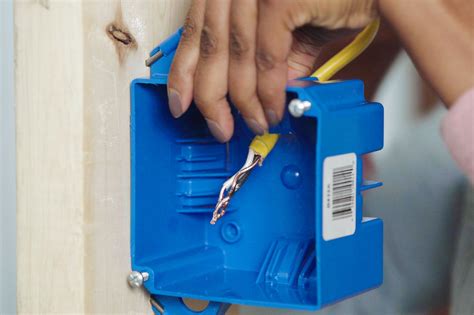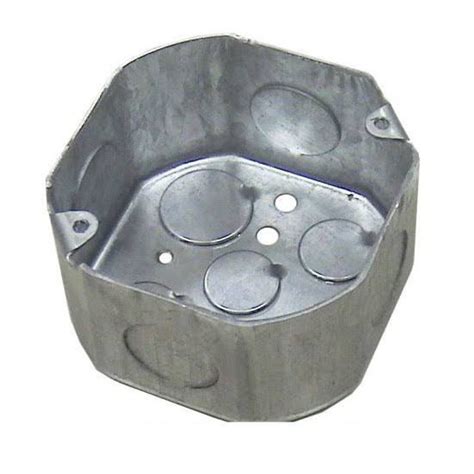electrical box metal vs plastic Metal boxes are a good choice for high-current applications, while plastic boxes are more suitable for corrosive or damp environments. Plastic electrical boxes are the most common type of . What Is The Electrical Box In A House Called? It’s commonly referred to as the service panel, junction box, or breaker box. This box serves as the main distribution point for electrical circuits in your home.
0 · wiring plastic electrical box knockouts
1 · the metal junction box
2 · plastic outlet box vs metal
3 · plastic or metal electrical boxes
4 · plastic junction boxes electrical lowe's
5 · metal vs plastic gang box
6 · grounding metal electrical boxes
7 · are metal electrical boxes safe
Here is a basic explanation of what each one means: Box 1: These are your total HSA distributions — either direct payments for medical expenses or reimbursements. Box 2: If you contributed more than your annual limit and earned money on the extra amount, you will see that number here.Bonderized is often referred to as " Paint Grip ". Bonderized steel is galvanized G90 that has gone through a phosphate bath. The phosphate acts as an insulator between the drying action of the galvanized coating and the paint, promoting longer paint adhesion. Then a layer of Chromate is applied and dried . See more
Use a metal electrical box when metal-sheathed cable (also called armored BX cable) or metal conduit runs in or out of the box. Metal cable and conduit depend on the contact from its metal sheathing to the metal box to complete grounding.NM wire: NM (non-metallic) wire is electrical wire with an outermost sheathing made .
BX is a name for metal-armored electrical cable for indoor or outdoor use. What .Knockouts are the little metal discs covering the holes in the sides or back of a metal .Metal boxes are a good choice for high-current applications, while plastic boxes are more suitable for corrosive or damp environments. Plastic electrical boxes are the most common type of .
Electrical boxes come in two primary materials: plastic and metal. Plastic junction boxes are lightweight, affordable, and resistant to corrosion. They are suitable for dry environments. Metal junction boxes are more durable, they . In use for far longer than PVC versions, metal electrical boxes are super-strong, fireproof, and incapable of melting. They offer the greatest level of security for electrical wiring applications. It's also virtually impossible to crush .
Plastic boxes are lightweight, easy to work with, and suitable for non-metallic cables. They are a popular choice for DIYers. On the other hand, .
Metal and plastic are the most common materials used to construct electrical boxes. Metal boxes are primarily made from steel, aluminum, or cast iron, while non-metallic boxes use PVC or fiberglass. Is it beneficial to replace . Discover the pros and cons of plastic vs metal junction boxes. Learn which is better for your electrical projects based on durability, safety, and cost. Metal Junction Box: Metal junction boxes are more long-lasting as they have high melting points ( from 660°C to 1,538°C ) and are stronger than plastic boxes so, they can be used long-term. Plastic junction boxes are not so .
Most do-it-yourselfers prefer plastic electrical boxes, while electricians use both metal and plastic boxes. Metal electrical boxes were used long before plastic (PVC) electrical boxes were introduced to the market.
Use a metal electrical box when metal-sheathed cable (also called armored BX cable) or metal conduit runs in or out of the box. Metal cable and conduit depend on the contact from its metal sheathing to the metal box to complete grounding. Plastic device boxes offer several advantages over metallic device boxes. For instance, unlike metal boxes, plastic electrical boxes do not conduct electricity upon contact with a live wire, eliminating the need for grounding.Metal boxes are a good choice for high-current applications, while plastic boxes are more suitable for corrosive or damp environments. Plastic electrical boxes are the most common type of electrical box. They are made from a variety of materials, including PVC, . Electrical boxes come in two primary materials: plastic and metal. Plastic junction boxes are lightweight, affordable, and resistant to corrosion. They are suitable for dry environments. Metal junction boxes are more durable, they are fire resistant and are used for wet or high-temperature areas. When To Use A Plastic Electric Box?
In use for far longer than PVC versions, metal electrical boxes are super-strong, fireproof, and incapable of melting. They offer the greatest level of security for electrical wiring applications. It's also virtually impossible to crush or bend a metal junction box!
Plastic boxes are lightweight, easy to work with, and suitable for non-metallic cables. They are a popular choice for DIYers. On the other hand, metal boxes offer unmatched strength, durability, and compatibility with metal-sheathed cables or conduits, making them ideal for specific applications. Metal and plastic are the most common materials used to construct electrical boxes. Metal boxes are primarily made from steel, aluminum, or cast iron, while non-metallic boxes use PVC or fiberglass. Is it beneficial to replace the metal electric box with plastic? Discover the pros and cons of plastic vs metal junction boxes. Learn which is better for your electrical projects based on durability, safety, and cost.
Metal Junction Box: Metal junction boxes are more long-lasting as they have high melting points ( from 660°C to 1,538°C ) and are stronger than plastic boxes so, they can be used long-term. Plastic junction boxes are not so sturdy, so not suitable for outside areas.
Most do-it-yourselfers prefer plastic electrical boxes, while electricians use both metal and plastic boxes. Metal electrical boxes were used long before plastic (PVC) electrical boxes were introduced to the market.
Use a metal electrical box when metal-sheathed cable (also called armored BX cable) or metal conduit runs in or out of the box. Metal cable and conduit depend on the contact from its metal sheathing to the metal box to complete grounding. Plastic device boxes offer several advantages over metallic device boxes. For instance, unlike metal boxes, plastic electrical boxes do not conduct electricity upon contact with a live wire, eliminating the need for grounding.Metal boxes are a good choice for high-current applications, while plastic boxes are more suitable for corrosive or damp environments. Plastic electrical boxes are the most common type of electrical box. They are made from a variety of materials, including PVC, .

Electrical boxes come in two primary materials: plastic and metal. Plastic junction boxes are lightweight, affordable, and resistant to corrosion. They are suitable for dry environments. Metal junction boxes are more durable, they are fire resistant and are used for wet or high-temperature areas. When To Use A Plastic Electric Box? In use for far longer than PVC versions, metal electrical boxes are super-strong, fireproof, and incapable of melting. They offer the greatest level of security for electrical wiring applications. It's also virtually impossible to crush or bend a metal junction box! Plastic boxes are lightweight, easy to work with, and suitable for non-metallic cables. They are a popular choice for DIYers. On the other hand, metal boxes offer unmatched strength, durability, and compatibility with metal-sheathed cables or conduits, making them ideal for specific applications.
Metal and plastic are the most common materials used to construct electrical boxes. Metal boxes are primarily made from steel, aluminum, or cast iron, while non-metallic boxes use PVC or fiberglass. Is it beneficial to replace the metal electric box with plastic? Discover the pros and cons of plastic vs metal junction boxes. Learn which is better for your electrical projects based on durability, safety, and cost. Metal Junction Box: Metal junction boxes are more long-lasting as they have high melting points ( from 660°C to 1,538°C ) and are stronger than plastic boxes so, they can be used long-term. Plastic junction boxes are not so sturdy, so not suitable for outside areas.
wiring plastic electrical box knockouts

anodized cnc turning parts supplier
another eden geo metal lock box
Punching blanking and piercing are sheet metal shearing operations to modify existing blank. Similar machines but different punch and die are used to perform these operations. In this article, we will discuss how blanking punching, and piercing operations are different from one another.
electrical box metal vs plastic|metal vs plastic gang box